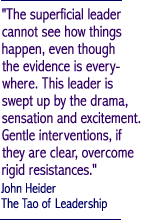
Tips for better meetings
How to move things along, whether
you're running the meeting or not
Have you ever been in a meeting with a designated facilitator who just isn’t guiding the meeting in a useful manner? If you’re breathing, I bet the answer is yes.
It’s okay. Not everyone can turn lessons from a seminar or processes from a corporate manual into a productive, enjoyable meeting. Unfortunately, the presence of a white-board and markers do not guarantee a productive, efficient meeting! The great thing is that you can help improve the meeting without stepping on the designated meeting leader's toes.
Facilitation is a series of assessments and actions — not a title

Facilitation is a series of assessments and actions. People assess the group’s responses and use verbal and body language to guide the meeting toward the goal. For example, the boss might notice that no one is contributing ideas, so he begins to dominate the meeting; when someone else voices a concern or alternative, he definitively points out why the idea's not possible. He has helped facilitate the meeting to its next level (probably fear). While this is an example of unhealthy facilitation, it does demonstrate how all meeting participants are part and parcel to the goings on and outcome of a meeting.
Things you can do to facilitate behind-the-scenes
If you find that a meeting isn’t headed toward its goal (or worse, if there's been no goal articulated), put the following techniques into place to help guide the meeting while not wresting control from the assigned facilitator.
"I know we'd all like this meeting to be really productive, so can we take a few minutes before we continue, and identify what we'd like to accomplish and come up with how we might do that in the time we have available?"
If the meeting leader hasn't articulated a purpose, agenda and timeframe, ask to review these before the meeting gets too far underway.
Ask questions:
If the facilitator has overlooked assumptions group members have made, if a point isn’t clear or if people are agreeing to conflicting items, ask a question. By asking, you are raising an issue without labeling someone as right or wrong — you're asking for clarification. Also, open-ended questions allow members to share ideas and regroup around a key issue.
Recap points:
If you believe that decisions made and actions agreed-upon are not getting the approval or the attention they deserve, recap the points before moving on.
Propose:
Make suggestions as to how a meeting process might be shifted if you sense that the group is stuck or going around in circles. Framing the idea as a suggestion, and asking to throw it onto the table, defers to the group and the Facilitator. By linking your suggestion to the meeting goal, participants will better understand that your interest lies with the group — not with controlling the meeting.
Be prepared, then let it go:
Show up to the meeting fully prepared to participate and to handle anything that might happen during the meeting. With a clear mind, you’ll be able to curb any of your reactions and focus on responses and behind-the-scenes facilitation that result in worthwhile meetings.
So, the next time you’re dubbed a participant and not a Facilitator, remember that you’ve got the tools to support a Facilitator — and get what you need from the meeting — without anyone knowing!
"Eric, to make sure we're all assuming the same meaning, would you please explain what you mean when you say, ‘world-class service’?"
"Before we continue, I want make sure I’ve got all of the points correct…[List out points] Is that correct?"
"I think we’re talking about three separate issues here: X, Y and Z. I’d like to suggest that we concentrate on one issue and its solution before tackling the next. This way, we can make sure we get everyone’s ideas into the pot. How does that sound?"
Create a best, middle and worst case scenario for the meeting with corresponding responses for each. Meditate or just take a couple of minutes ‘off’ before the meeting starts. Know the information you need for the meeting, and step up to the plate to share your knowledge when the time comes.
Search Ivy Sea Online - Topic Guides
Remember, this information provides food-for-thought. Your needs are unique, so the most effective leadership, organizational or interpersonal communication plans are those that have been be customized to meet your unique needs. Have questions? Consult a qualified adviser, or feel free to email us for ideas.
Inspired-Leadership Resource Portal
IntraPersonal and Mindset Mastery Portal
What else would you like to see us cover? What are your key leadership and communication issues or experiences in the workplace? Let us know!